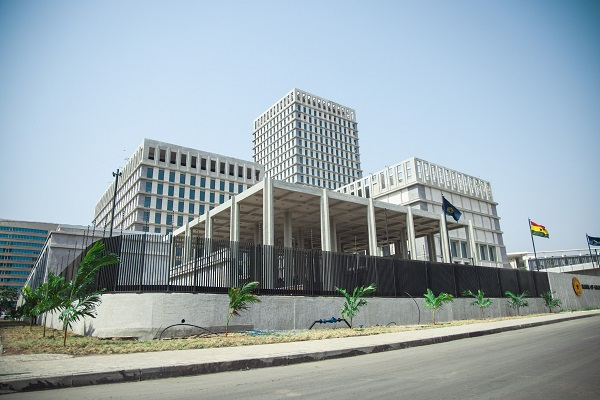ERTAINLY, Ghana’s agri-food Small and Medium Enterprises (SMEs) industry plays a vital role in building a robust economy.
The sector, which remains an essential contributor to the growth of the country’s economy, continues to contribute significantly to the national Gross Domestic Product (GDP), employment and food security.
The agri-food value chain involves the journey of a food product from the farm to the consumer, including input suppliers, farmers, processors, distributors and retailers, creating vast employment opportunities and promoting food security.
It’s a well-known fact that the northern belt is a major contributor to Ghana’s agricultural industry.
Bono East
The Bono East Region within the northern belt is noted for its active involvement in agri-food SMEs.

Gloria Azerongma Salifu, Bono Regional Principal Regulatory Officer of the FDA
The region, with 11 municipal and district administrative areas, has vast fertile land suitable for agriculture and agribusiness.
Its population is about 880,921 according to the 2021 Population and Housing Census.
Majority of its population are energetic young people, including graduates who have ventured into agriculture and agribusiness, increasing the number of youth in the industry.
The Monitoring and Evaluation Officer at the Bono East Regional Department of Agriculture, Bawa Amidu, told the Daily Graphic that several youths in the region had ventured into agriculture and agribusiness.
He, however, said the youth were interested in vegetable production more than the tree crops because of their short gestation period.
“But we also realised that the elderly have shifted from crop production to tree crops such as cocoa and cashew because the sector is more regulated,” he said.
Mr Amidu said the region’s agriculture and agribusiness prospects were bright because of the youth’s active involvement in the sector.
Challenges
However, one of the major challenges that keeps frustrating the industry players, particularly start-ups in the agrifood-SMEs is bureaucracy and regulatory hurdles hindering the efficient operation of agrifood-SMEs.

Bawa Amidu, Monitoring and Evaluation Officer at the Bono East Regional Department of Agriculture
Some Agrifood entrepreneurs, mainly start-ups, told the Daily Graphic that the process involved in registering their business or products was too cumbersome and frustrating.
The industry players said they go through several frustrations and processes when engaging with regulatory agencies to license and register their businesses.
These challenges, they said, negatively affect the growth of their businesses.
They said they had to go through several regulatory agencies such as the Ghana Revenue Authority (GRA), Food and Drugs Authority (FDA), Registrar General’s Department (RGD), Ghana Investment Promotion Centre (GIPC) and Ghana Standards Authority (GSA).
Others include the Ghana Enterprises Agency (GEA), metropolitan, municipal and district assemblies (MMDAs), among others, to get their businesses licensed.
Frustrating processes
Sharing her experience, a 33-year-old Sobolo (a beverage made from hibiscus) producer, Asana Fatima, told the Daily Graphic that she went through several frustrating processes to get the FDA to approve her products.

Prof. Justice Bawole (inset), Dean of the University of Ghana Business School
She said it took her more than six months to complete the registration process because of the long procedure and requirements involved.
“I nearly halted the process because it was time-consuming, frustrating and costly because I had to travel from Techiman to Sunyani every week,” she said.
Another fruit juice producer, Evelyn Pomaa, who had no formal registration of her business, told the Daily Graphic that she was interested in registering, but the process involved was killing her desire to do so.
“I have not made any attempt, but I had an experience with my friend, who registered her business. I don’t want to go through similar frustrations,” she said.
Mrs Pomaa appealed to the government to decentralise the operations of the regulatory agencies to reduce the cost of travelling.
FDA response
However, the Bono Regional Principal Regulatory Officer of the FDA, Gloria Azerongma Salifu, told the Daily Graphic that FDA registration processes were not as cumbersome as the public say.

The participants
“Our officers are willing to help applicants go through the process. So you don’t need a middleman to register your products,” she said.
Mrs Salifu said because safety was paramount to the FDA, they had put in place several measures, including online registration, to make the process easier and faster.
She said the documentation was for safety purposes, which focused on the persons, the raw materials, lab analysis of the product and the facility.
Mrs Salifu said some of the processes were free, adding that FDA was always ready to assist businesses acquire the necessary documentation.
She urged potential agrifood entrepreneurs and other MSMEs to ignore the information that registering businesses with FDA and other regulatory agencies was frustrating.
NKABOM initiative
In a bid to resolve the frustrations start-ups go through to register their businesses and expand access to education and career opportunities in the food systems, a northern belt stakeholders dialogue on Agrifood Regulation and youth enterprises has been organised for the industry players at Hansua near Techiman in the Bono East Region.
It was organised by the University of Ghana (UG) through its Nutrition and Sustainable Agri-food Collaborative (NKABOM), an entrepreneurship pillar, in partnership with McGill University and Mastercard Foundation.
The engagement brought together key regulatory institutions, youth-led agri-food businesses, and local policymakers across the nine regions in the northern belt of Ghana.
The aim was to foster dialogue on regulatory challenges, support mechanisms and pathways for co-creating an enabling environment for agrifood SMEs.
The pillar is part of the institution’s efforts to strengthen Ghana’s agri-food entrepreneurship ecosystem and promote dialogue between regulatory agencies and agri-food start-ups.
The partnership is to enhance capacity building by equipping students and beneficiaries with skills and resources needed to create sustainable livelihoods within the agri-food systems sector.
The project is guided by three key objectives, namely learning and training, inclusive access and food security and entrepreneurship promotion.
Food safety
The Dean of the University of Ghana Business School (UGBS), Professor Justice Bawole, said the engagement was to foster a dialogue-driven approach to address challenges in food production, processing, distribution and retail.
He said the dialogue was also to advocate regulatory reforms that align with international food safety and trade standards.
Prof. Bawole said the engagement was to enhance policy implementation, compliance and enforcement in food safety, trade and sustainability.
He said it would help bridge the gap between regulatory bodies and agri-food start-ups across the northern belt by facilitating dialogue and co-developing strategies for a more enabling business environment.
He said the UG NKABOM was a strategic initiative aimed at transforming the agri-food system of Ghana, by empowering people, particularly the youth, women, persons with disabilities and internally displaced persons.
Prof. Bawole said the project was crucial for improving food security, enhancing livelihoods and driving national development.
The Bono East Regional Head of Compliance and Debt Manager at the GRA, Mohammed Ibrahim, said: “By law, the first institution to go to when developing a business idea is GRA.
At this initial stage, you will discuss your business plan with GRA for advice.”
He explained that GRA would give advice on the proposed business in order to help them succeed.
The stakeholder interactions brought to the fore the need for regulatory reforms to streamline regulations and reduce bureaucratic hurdles, to create a more conducive environment for agri-food SMEs.
Writer’s email: [email protected]






































































